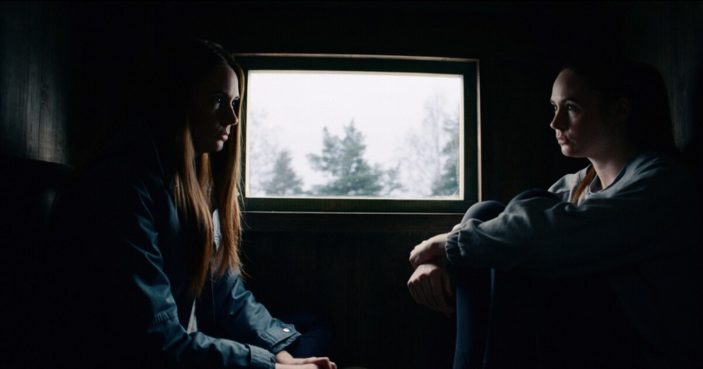
With its mix of deadpan satire and high concept sci-fi – comparisons to Yorgos Lanthimos’ 2015 dystopian black comedy The Lobster feel imminent – Dual may be an off-putting experiment to many who can’t readily accept Riley Stearns‘ mentality. It certainly helps that the film is headlined by the wonderful Karen Gillan though, delivering two intense performances, whose presence, along with the wonderful support of an intentionally robotic Aaron Paul, is likely to generate a wider (unsuspecting) audience for a film that is acutely aware its catering for a niche crowd.
In the not-too-distant-future, it’s come to pass that anyone who can afford to do so can have themselves cloned, so in the event of their death they can essentially live on as a double. The idea is that this double will soak up enough of the soon-to-be-deceased’s personality for them to function successfully within the lifestyle their original has made for themselves. It’s an alarmingly simple process, and it’s one Gillan’s Sarah must take upon herself when she learns she has been diagnosed with a terminal illness; “Nothing is ever certain, but this most definitely is” is her doctor’s monotone delivery when Sarah questions just whether or not she’s going to die.
Sarah isn’t the most exciting of people. She actively avoids conversations with her mother (Maija Paunio), and interactions with her boyfriend, Peter (New Zealand actor Beulah Koale), are bland, to say the least, as she video chats him nightly whilst he’s away working, though he clearly is enjoying the company of his co-workers more. It’s a sad existence, so it comes as no surprise that Sarah’s eventual clone doesn’t exactly want to entirely follow in her footsteps. She has clearer skin, shinier hair, and less body fat, and both Sarah’s mother and Peter enjoy her company more, leading Sarah to feel as if she has already been replaced before she’s even passed on.
The film’s major hook – and this isn’t a spoiler – is that Sarah finds out she isn’t dying. In fact she’s in complete remission, and, as is apparently the law in this near future, a clone and their original can’t exactly live harmoniously together, but if a clone doesn’t want to be decommissioned, they have the right to challenge their original to a duel. Their lives are literally on the line, and when the date is set, both have to show up and fight to the death; Stearns opens the film with such a set-piece, as two identical men battle each other in front of cameras and a live audience, indicating that such a situation has become a gleeful spectator sport.
It’s a fascinating concept, and when Sarah hires personal trainer Trent (Paul, hilarious) to help her prepare for her battle, the film’s bone-dry humour kicks further into gear, so much so that you wish their interactions became a more staple ingredient. Instead Dual aims for more social commentary and never really commits to many of the relationships it starts to feel out. And after such an effective opening, it can’t help but feel a little underdone when Dual fails to indulge more of its action mentality, though its choice to shift away from the expected at least means the film is never predictable.
Though the story may not always feel as if it squeezes the most mileage out of its concept, Gillan’s utter commitment to making both Sarah and her clone fully realised characters, earning our sympathy along the way, means Dual remains an investing project, even if we wish this fascinating world was explored further than what we are afforded.
![]()
![]()
![]()
![]()
![]()
THREE AND A HALF STARS (OUT OF FIVE)
Dual is screening as part of this year’s Melbourne International Film Festival, running in cinemas between August 4th and 21st, 2022, and online through MIFF Play August 11th and 28th, 2022. For more information head to the official MIFF page.
Dual was originally reviewed as part of this year’s Sundance Film Festival coverage.
